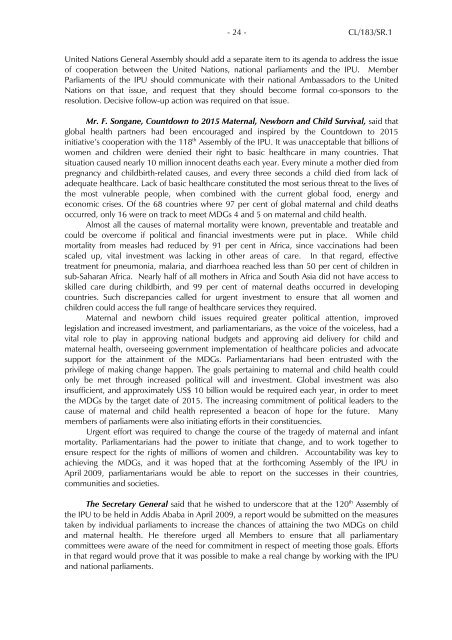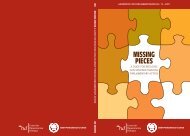CASE No - Inter-Parliamentary Union
CASE No - Inter-Parliamentary Union
CASE No - Inter-Parliamentary Union
Create successful ePaper yourself
Turn your PDF publications into a flip-book with our unique Google optimized e-Paper software.
- 24 - CL/183/SR.1<br />
United Nations General Assembly should add a separate item to its agenda to address the issue<br />
of cooperation between the United Nations, national parliaments and the IPU. Member<br />
Parliaments of the IPU should communicate with their national Ambassadors to the United<br />
Nations on that issue, and request that they should become formal co-sponsors to the<br />
resolution. Decisive follow-up action was required on that issue.<br />
Mr. F. Songane, Countdown to 2015 Maternal, Newborn and Child Survival, said that<br />
global health partners had been encouraged and inspired by the Countdown to 2015<br />
initiative’s cooperation with the 118 th Assembly of the IPU. It was unacceptable that billions of<br />
women and children were denied their right to basic healthcare in many countries. That<br />
situation caused nearly 10 million innocent deaths each year. Every minute a mother died from<br />
pregnancy and childbirth-related causes, and every three seconds a child died from lack of<br />
adequate healthcare. Lack of basic healthcare constituted the most serious threat to the lives of<br />
the most vulnerable people, when combined with the current global food, energy and<br />
economic crises. Of the 68 countries where 97 per cent of global maternal and child deaths<br />
occurred, only 16 were on track to meet MDGs 4 and 5 on maternal and child health.<br />
Almost all the causes of maternal mortality were known, preventable and treatable and<br />
could be overcome if political and financial investments were put in place. While child<br />
mortality from measles had reduced by 91 per cent in Africa, since vaccinations had been<br />
scaled up, vital investment was lacking in other areas of care. In that regard, effective<br />
treatment for pneumonia, malaria, and diarrhoea reached less than 50 per cent of children in<br />
sub-Saharan Africa. Nearly half of all mothers in Africa and South Asia did not have access to<br />
skilled care during childbirth, and 99 per cent of maternal deaths occurred in developing<br />
countries. Such discrepancies called for urgent investment to ensure that all women and<br />
children could access the full range of healthcare services they required.<br />
Maternal and newborn child issues required greater political attention, improved<br />
legislation and increased investment, and parliamentarians, as the voice of the voiceless, had a<br />
vital role to play in approving national budgets and approving aid delivery for child and<br />
maternal health, overseeing government implementation of healthcare policies and advocate<br />
support for the attainment of the MDGs. Parliamentarians had been entrusted with the<br />
privilege of making change happen. The goals pertaining to maternal and child health could<br />
only be met through increased political will and investment. Global investment was also<br />
insufficient, and approximately US$ 10 billion would be required each year, in order to meet<br />
the MDGs by the target date of 2015. The increasing commitment of political leaders to the<br />
cause of maternal and child health represented a beacon of hope for the future. Many<br />
members of parliaments were also initiating efforts in their constituencies.<br />
Urgent effort was required to change the course of the tragedy of maternal and infant<br />
mortality. Parliamentarians had the power to initiate that change, and to work together to<br />
ensure respect for the rights of millions of women and children. Accountability was key to<br />
achieving the MDGs, and it was hoped that at the forthcoming Assembly of the IPU in<br />
April 2009, parliamentarians would be able to report on the successes in their countries,<br />
communities and societies.<br />
The Secretary General said that he wished to underscore that at the 120 th Assembly of<br />
the IPU to be held in Addis Ababa in April 2009, a report would be submitted on the measures<br />
taken by individual parliaments to increase the chances of attaining the two MDGs on child<br />
and maternal health. He therefore urged all Members to ensure that all parliamentary<br />
committees were aware of the need for commitment in respect of meeting those goals. Efforts<br />
in that regard would prove that it was possible to make a real change by working with the IPU<br />
and national parliaments.
















